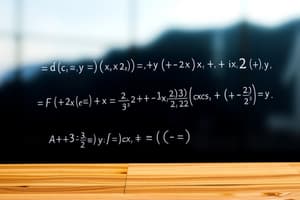Podcast
Questions and Answers
What is the main purpose of defining a limit in calculus?
What is the main purpose of defining a limit in calculus?
- To calculate the derivative of a function
- To determine the value of a function at a specific point
- To find the maximum value of a function
- To understand the behavior of a function as it approaches a certain point (correct)
Which of the following statements about limits is true?
Which of the following statements about limits is true?
- Limits always converge to a finite number.
- A limit can be defined at every point of a function.
- A limit can exist even if the function does not exist at that point. (correct)
- Limits can only be evaluated for polynomial functions.
If the limit of a function as $x$ approaches 3 is 5, which of the following is true?
If the limit of a function as $x$ approaches 3 is 5, which of the following is true?
- The function equals 5 when $x$ is 3.
- The limit is only valid for $x$ greater than 3.
- The function approaches 5 as $x$ approaches 3. (correct)
- The function has a maximum value at $x$ = 3.
What does it mean when we say a limit approaches infinity?
What does it mean when we say a limit approaches infinity?
Which of the following is a technique for evaluating limits without direct substitution?
Which of the following is a technique for evaluating limits without direct substitution?
Study Notes
Purpose of Defining a Limit in Calculus
- A limit provides a way to understand the behavior of functions as they approach specific points, allowing analysis of function continuity and discontinuities.
- Limits are foundational for defining derivatives and integrals, essential concepts in calculus.
True Statements About Limits
- A limit can exist even if the function is not defined at that particular point, highlighting limits' role in understanding function behavior.
Limit of a Function
- If the limit of a function as ( x ) approaches 3 is 5, it implies that as ( x ) gets closer to 3, the function's values trend toward 5.
- This relationship does not require the function to equal 5 at ( x = 3 ).
Limit Approaching Infinity
- When a limit approaches infinity, it indicates that the function's values grow without bound as ( x ) approaches a certain value or infinity itself.
- It signifies that the function does not settle at a finite value but instead exceeds any predefined bounds.
Techniques for Evaluating Limits
- L'Hôpital's Rule is a common technique for evaluating limits when facing indeterminate forms like ( \frac{0}{0} ) or ( \frac{\infty}{\infty} ) by differentiating the numerator and denominator.
- Other techniques include factoring, rationalizing, and using limit theorems.
Studying That Suits You
Use AI to generate personalized quizzes and flashcards to suit your learning preferences.
Description
Test your understanding of functions and limits in calculus with this quiz. It covers essential concepts including the definition of limits, properties, and techniques for evaluating limits. Perfect for students looking to reinforce their knowledge of this fundamental topic in mathematics.




